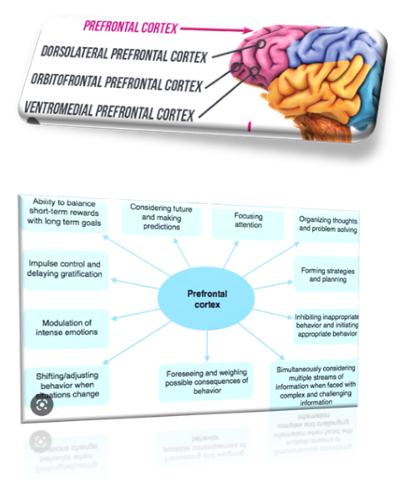Life gives us various ‘fronts’ to deal with, to challenge, to manage, to fight for, to succeed, to move ahead,&to achieve a goal. To accomplish this, our judicious brain is working 24/7 in a desire to live a fuller life. Pre-frontal cortex (PFC) is that prudent region of the brain’s cerebral cortex which is chiefly responsible to undertake intellectual tasks. Etymologically, term “prefrontal” had been introduced in 1868 by Richard Owen& PFC was considered as an area that was restricted to the anterior-most part of the frontal lobe (nearing to frontal pole).
Let us understand a bit in detail what PFC of the brain is exactly? It is a cortical structure of the brain which wraps the cerebral cortex of the frontage (forehead area) of the frontal lobe.It is extremely sagacious in nature andhas been alluded to the functions like reasoning & planning complex cognitive behavior, personality expression, decision making, and moderating social behavior. Anatomically, the prefrontal cortex is comprised of multiple Brodmann areas (BA) but recently in 2019, Ben Shalom and Bonneh suggested a narrow prefrontal cortex with 4 streams of information: motor (BA 8), emotion (BA 9), memory (BA 10), and perception (BA 11) in usual human/animal cognition.PFC is attributed to all the tasks related to intelligence, reasoning, planning, focus, attention, decision making, flexible thinking, impulse control, processing speed, learning & more.

Functions of Prefrontal Cortex
Role of PFC is attributed to cognitive control (CC) and Executive functions (EF). Cognitive control (CC) is in simple term is a goal-directed behavior with controlled processing &. executive functions (EF) include habits that involves automatic processing. Both CC & EF are related to the functions of the prefrontal cortex (PFC) and related regions and networks.
What Happens if the PFC is damaged?
Multiple evidence from various research suggests that an injury or damage or lesion of PFC leads to difficulties with involved cognitive skills like planning & behavior. It also effects the expression as well as the experience of emotions in a knotty manner. Though, patients with damage to prefrontal cortex lacks exhibiting the typical signs of a brain injury instead can have normal movement, preserved intelligence, and senses intact.

Historical Case of Phineas Gage- Frontal lobe damage
‘The case of Phineas Gage has been of huge interest in the field of neuropsychology. Phineas Gage was an American railroad construction foreman in Cavendish Vermont &suffered a severe brain injury from an iron rod penetrating his skull, of which he miraculously survived with extreme changes in hispersonality as a result of the damage of the frontal lobe of his brain. Years later neurologists found that the damage caused by the rod involved both the left and right prefrontal cortices. The left and right cortices are responsible for emotional processing and rational decision-making; therefore, it can be assumed that Gage had deficits in these areas.Gage’s case is famous in the field as it shows the resilience of the human brain and illustrates how certain areas of the brain have different functions and contribute to our personality’.

People with prefrontal cortex damage flourish in a highly structured and organized environment. For that reason, apparently, they appear to have full recovered from the injury, but then, the close kith & kins, family, caregivers might point out more worrying changes such as.,
- blunted emotional responses,
- becoming more aggressive and irritable,
- struggling to initiate activities,
- poor performance on tasks requiring long-term planning and impulse inhibition,
- lack of empathy,
- short-term memory loss or amnesia,
- inflexibility and stubbornness
- lack of perseveration
- creative tasks or initiative are tougher for them to execute/complete
Seeing as these issues cognitive in nature, the therapeutics & management involves cognitive remediation & cognitive rehabilitation therapies to improve person’s complex cognitive functions using specific neuropsychological assessments, tests, tools &techniques to manage& restore the executive dysfunction& complex cognitive control.
#PFC #Brainandpfc
Credit: Dr. Mohita S, Ph.D., Books & Internet

